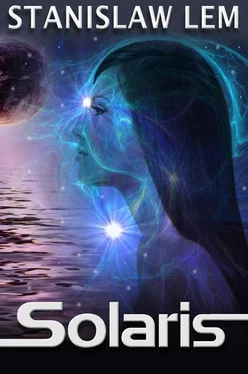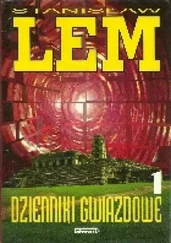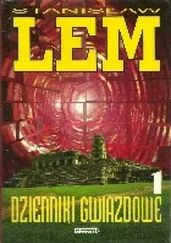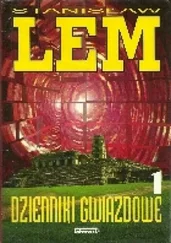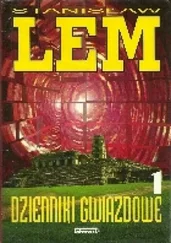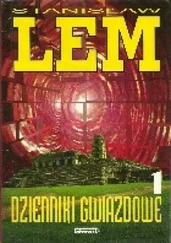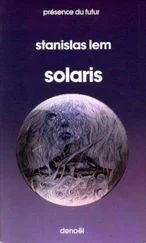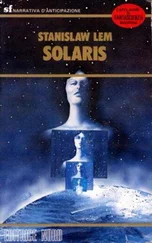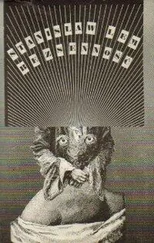The absolute failure to keep any large or small portion of the monster alive, or at least in a state of suspended vegetation or hibernation, away from its planetary organism, became the source of a belief (developed by the school of Meunier and Prorokh) that there was in fact only one single mystery to solve, and that once we opened it with the right interpretive key, everything would immediately be clear…
In the search for this key, this philosopher’s stone of Solaris, time and energy were expended by people who often had nothing to do with science, and in solaristics’ fourth decade the numbers of maniacal impostors from outside the scientific community, zealots whose fanaticism exceeded that of their distant predecessors, like the prophets of the “perpetuum mobile” or the “squaring of the circle”—their numbers, then, assumed the dimensions of an epidemic, actually alarming many psychologists. After a few years, however, this passion died down, and when I was preparing for my voyage to Solaris, both it and the ocean that had inspired it had long disappeared from newspaper headlines and from daily conversation.
As I replaced Gravinsky’s volume on the shelf, next to it — since the books were arranged alphabetically — I noticed, barely visible between the thick tomes, a small pamphlet by Grattenstrom, one of the most curious blooms of the solaristic literature. It was a work that, in the struggle to understand the Non-Human, was directed against humans themselves, against people, a kind of lampoon of our species, furious in its mathematical coldness. It was written by a self-taught scholar who had first published a series of outstanding contributions to certain highly specific and rather marginal branches of quantum physics. In his most important and most extraordinary work, a mere dozen or so pages long, he sought to demonstrate that even the most seemingly abstract, sublimely theoretical, mathematicized achievements of science have in reality moved only a step or two away from a prehistoric, coarsely sensory-based, anthropomorphic understanding of the world around us. Grattenstrom examined the formulas of relativity theory and of the theorem of force fields; he looked at parastatics and the hypotheses of a unified cosmic field, in search of traces of the human body — all that comes from and is a consequence of the existence of our senses, the structure of our organism, and the limitations and weaknesses of humankind’s animal physiology. He reached the conclusion that there cannot now, nor in the future could there ever be, talk of “contact” between human beings and any non-humanoid civilization. In this satire against the entire species the thinking ocean is not mentioned once, but its presence, in the shape of a contemptuously triumphal silence, could be sensed underlying virtually every sentence. That was at any rate the impression I had had when I read Grattenstrom’s pamphlet for the first time. This work was actually more of a curio than a work of solaristics in the strict sense of the term; it was included in the library of classics of the genre because it had been placed there by Gibarian himself — who, as it happened, had been the one who gave it me to read.
With a strange feeling akin to respect I slipped the slim unbound offprint back among the books on the shelf. I ran my fingertips over the green and brown Almanac of Solaristics . Amid all the chaos and helplessness we were embroiled in, it couldn’t be denied that the experiences of the last few weeks had given us some certainty on a couple of fundamental questions over which a sea of ink had been spilled in recent years — debates that previously had been futile because they were unresolvable.
Someone fond of paradoxes and sufficiently stubborn could go on doubting that the ocean was a living being. But it was impossible to deny the existence of its mind, whatever could be understood by the term. It had become quite clear that it was only too aware of our presence above it… That statement alone disconfirmed the entire expansive wing of solaristics that declared the ocean to be “a world unto itself,” “a being unto itself,” deprived by a process of repeated atrophy of its former sensory organs, such that it supposedly knew nothing of the existence of external phenomena or objects, enclosed in a vortex of gigantic currents of thought whose abode, cradle, and creator were the depths spinning beneath their two suns.
And more: we had learned it could synthesize artificially that which we ourselves could not — our bodies — and even improve them by introducing into their subatomic structure inconceivable changes which probably had something to do with the purposes that drove it.
It existed then, it lived, thought, acted; the possibility of reducing the “Solaris problem” to nonsense or to zero, the belief that we were not dealing with any Being, and by the same token that our loss was not in fact any kind of loss — all this was gone for good. Whether they liked it or not, human beings had to take cognizance of a neighbor that, though it was billions of miles away across the void and separated from us by entire light years, still lay in the path of their expansion, and was harder to grasp than the whole of the rest of the Universe.
We may be at the turning point of all history, I thought to myself. A decision to give up, turn back, either now or in the near future, could prevail; I no longer regarded even the closing down of the Station as improbable, or at least beyond the bounds of possibility. But I didn’t believe that anything could be saved in this way. The very existence of the thinking colossus would never let people abide in peace again. However much they traveled across the Galaxy and made contact with civilizations of other beings similar to us, Solaris would present a perpetual challenge to humankind.
One other small leather-bound volume had found its way among the yearbooks of the Almanac . I gazed for a moment at the cover, darkened from the touch of fingers, before I opened it. It was an old book, the Introduction to Solaristics by Muntius. I was remembering the night I spent poring over it, and Gibarian’s smile when he gave me his copy, and the terrestrial dawn in the window as I reached the words “The End.” Solaristics, wrote Muntius, is a substitute for religion in the space age. It is faith wrapped in the cloak of science; contact, the goal for which we are striving, is as vague and obscure as communion with the saints or the coming of the Messiah. Exploration is a liturgy couched in methodological formulas; the humble work of researchers is the expectation of consummation, of Annunciation, for there are not nor can there be any bridges between Solaris and Earth. This obvious fact, like many others — the absence of shared experiences, the absence of conveyable concepts — was rejected by solaricists, the same way the faithful reject arguments that would subvert the underpinnings of their faith. Besides, what do people expect, what can they want from “informational communication” with thinking seas? A recording of experiences of a being that endures through time, and is so old it probably cannot remember its own beginning? A description of the desires, passions, hopes and sufferings, that are released in the instantaneous birth of living mountains, the transformation of mathematics into existence, of loneliness and resignation into plenitude? Yet all this constitutes uncommunicable knowledge, and if one attempts to translate it into any terrestrial language, all those sought-after values and significations are lost, they remain on the far side. Besides, it isn’t these sorts of revelations, more worthy of poetry than science, that are hoped for by the “believers,” oh no; though they themselves are unaware of it, what they are waiting for is a Revelation that would explain to them the meaning of humankind itself! Solaristics, then, is the posthumous child of long-dead myths, the final flower of mystical yearnings that people no longer have the courage to utter aloud; while the cornerstone hidden deep in the foundations of this edifice is the hope of Redemption…
Читать дальше
